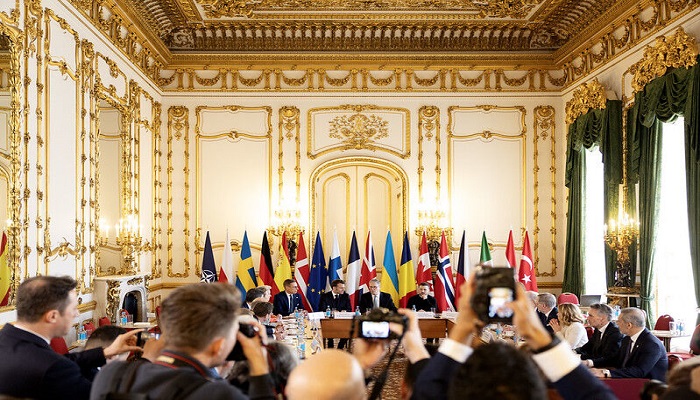PNN – The meeting of the foreign ministers of the United States, Britain, France, Germany, and Ukraine, which was scheduled to be held in London to negotiate a ceasefire and peace in Ukraine, was suddenly canceled and reduced to an expert level following disagreements between the parties; a development that is a clear sign of the division and discord among the Western countries supporting Kiev.
According to the report of Pakistan News Network, the British Foreign Office issued a statement announcing that the ministerial-level meeting on the ceasefire and the political future of Ukraine, which was scheduled to be held in London, has been canceled and instead, consultations will continue in the form of closed meetings at the level of officials of the five countries. This development came as Trump’s Secretary of State Marco Rubio canceled his trip to London due to what was described as “political preoccupations,” a decision that quickly drew a similar reaction from Paris and Berlin, leading to the cancellation of trips by the French and German foreign ministers.
In the wake of these developments, the White House announced that Steve Witkoff, Trump’s special envoy for Ukraine, will travel to Moscow for the fourth time in the coming days to meet with Vladimir Putin, fueling speculation about behind-the-scenes negotiations between Washington and Moscow.
One of the controversial issues has been the US proposal to recognize Russian sovereignty over the Crimean Peninsula in exchange for a halt to its military advance in other parts of Ukraine. In response to these reports, Ukrainian President Volodymyr Zelensky stated firmly: Ukraine will never recognize Russian sovereignty over Crimea. There is no point in negotiating.
Read more:
Ambiguity in the London Initiative: Efforts for Peace or Marginalization of Europe?
Britain, which has been a leading military supporter of Kiev since the beginning of the Ukrainian war, has in recent months attempted to play a more prominent role in the process of ending the war by presenting a diplomatic initiative. The London peace conference was supposed to be the culmination of these efforts; but the downgrading of the level of talks from the presence of foreign ministers to the expert level has raised serious doubts about the success of the initiative and London’s ability to lead the peace process.
Although British Foreign Secretary David Lammy announced on social media after calling his American counterpart Marco Rubio about a “constructive dialogue” and the continuation of “intensive expert meetings,” sources close to the British diplomatic team have expressed concern about the weakening of the London initiative. Especially since some speculation suggests parallel efforts by Washington to reach an agreement with Moscow without fully involving Europe.
In response, Britain and France are trying to maintain their weight in future equations by proposing the formation of a “pro-Ukraine coalition” through the deployment of multinational forces to ensure the implementation of the peace. But this plan also faces several obstacles, including serious doubts about US support and the lack of a clear consensus among other NATO members.
In such an environment, the London initiative, rather than being a sign of Western unity, seems to be a reflection of the deep divisions within the Western allies’ camp. This division has not only slowed down the peace negotiations but also casts the future of Europe’s place in the post-war order into a halo of uncertainty.
Will London fall victim to hidden Western rivalries?
The sudden postponement of the London meeting is not just a simple diplomatic slip-up, but a clear sign of the rift and distrust among Western actors regarding the war in Ukraine; a rift that has both cast the peace negotiations process into a haze of uncertainty and called into question Britain’s position as the host and architect of this initiative. Keir Starmer’s government, which in recent months has tried to consolidate its position against powerful rivals, including the Trump administration, by increasing the military budget and trying to play an active role on the international stage, is now facing the risk of a clear failure in the field of diplomacy.
Meanwhile, the cautious stance of France and Germany in the face of Washington’s fringe proposals, including the possibility of recognizing the annexation of Crimea, suggests intra-camp rivalries to shape the post-war order in Ukraine. These rivalries not only undermine Western cohesion but could also make the path to peace more complex and challenging.

